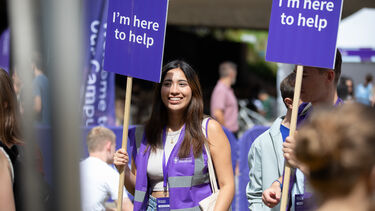I can whole-heartedly say that the teaching I’ve received has been exceptional from the core Korean language modules to the optional modules

What made you want to study Korean Studies?
For me, my initial interest into Korea, Korean culture and the Korean language, like many other people nowadays, originated from Kpop. In 2018 I first really started getting into Kpop, and from that point it didn’t take me long to expand my horizons on Korea as a whole. The reason why I wanted to study Korean Studies was primarily because I wanted to learn the Korean language in a more structured and serious way to what I had been learning at home on my own. Not only that, but I also wanted to learn more about the country, and particularly its recent history of impressive and rapid economic development, and I felt I could acquire this knowledge through the Korean Studies course.
What made The University of Sheffield stand out to you?
When I first looked at universities that offered a Korea-focused course, there really weren’t a whole lot to choose between. University rankings are important to me, so Sheffield’s ranking initially stood out to me as a reason to consider it as a front-runner. Furthermore, the structure of the course and the good reviews I had seen solidified it as a top choice for myself. Also, the relatively high entry requirements for the course too suggested that the quality of teaching would be very high to match the entry requirements, and the competitiveness of such a sought-ought course in recent years.
What do you like the most about the School?
There are so many positives regarding the School of East Asian studies, but if I had to choose the single best thing I would have to go with the quality of teaching and access to resources. Even up until now, I can whole-heartedly say that the teaching I’ve received has been exceptional, from the core Korean language modules to the optional modules about Korean culture. All of the lecturers are incredibly kind and helpful, and will go out of their way to help you as best they can, should you have something you need assistance with. The lectures also supply you with an incredibly ample number of resources for in-class learning and out of class, self-study which definitely enhance your learning and always gives you other food for thought, should you need it.
How have you found your year abroad and what advice would you give to someone about to go?
My year abroad has by far exceeded any and all of my expectations, and I can say with certainty that I would 100% want to return to Korea when looking for a job after graduation. Initially studying online had been a little challenging and somewhat disappointing, however the switch to an online- offline blend of teaching reignited my passion for learning the language. The teaching I had received had been top class from all of the teachers I have had, and the simplicity of making friends with other foreign students has made my time abroad all the more enjoyable and memorable. Living in Korea does have its ups and downs, and so my advice for anyone going on their year abroad would be to ensure they are well prepared to live alone and to be prepared mentally to study practically nonstop for up to 8 months. Studying in Korea is intense, so being aware of that beforehand certainly makes it less of a shock later on.
Do you know what you want to do at the end of your course?
Yes. After I graduate, I want to become an English teacher teaching in Korea. It’s something I have been considering for a while now, and I can say with full confidence that that is exactly what I want to be pursuing when I finish my course.

Visit us
Discover what sets Sheffield apart at our undergraduate open days on Saturday 21 June and Saturday 5 July 2025.

